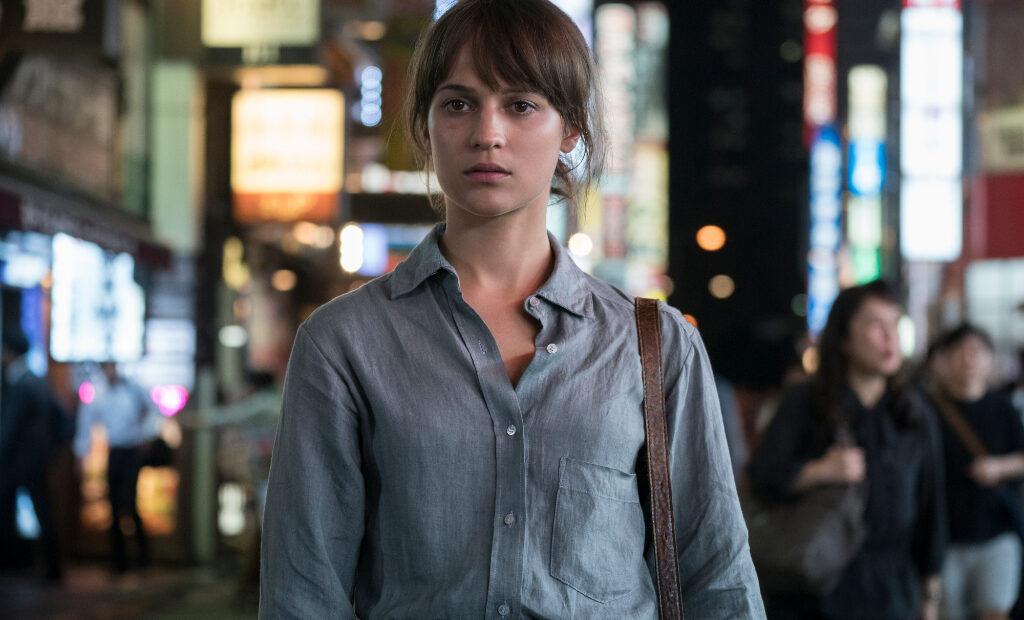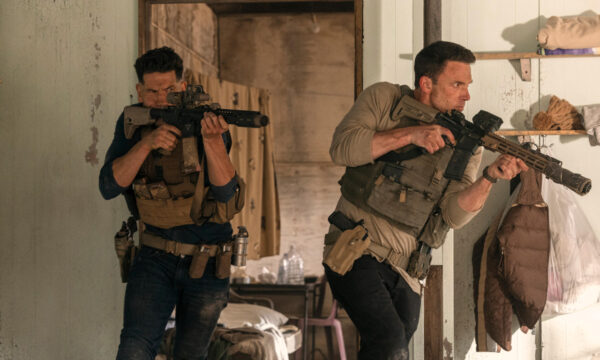The journey of coming to terms with guilt and grief: An interview with Earthquake Bird actor Alicia Vikander

Even the endlessly talented, Oscar-winning Alicia Vikander admits she couldn’t learn Japanese in just three months. Nonetheless, the Swedish actress masters a challenging role as the quiet but intense Lucy Fly in Wash Westmoreland’s noir thriller Earthquake Bird. We caught up with her at LFF and delved into her experiences shooting in Japan, learning how she chooses her projects, how to dupe the world into thinking you’re good at karaoke, and the mysteries of Japanese 7-Eleven’s perfectly salted hard-boiled eggs.
How was learning Japanese? Is it easy for you to learn a different language and a different culture as well?
I could not learn Japanese in three months. I wish that was the case. But, being bilingual and knowing what it takes to try and communicate in a language that is new to you, I knew it was a lot of work and I couldn’t just take the Japanese translation to the script and mimic someone who read it for me. There’s a lot of depth and subtext in what she’s saying, and you have to realise what she comes from.
I actually started by learning all the scenes that were going to be made in Japanese in English. I read them out how I wanted to act them, ish. That, of course, changes, but my dialect coach and this actress I work with (who’s Japanese-English) suddenly were like, “Wow, now I see this emotion, or sarcasm, or your tension, or where you want to take this scene.” The words that they directly translated to Japanese don’t make any sense if that doesn’t come across. Culturally, we don’t have the same signals or words to describe the same emotions you are trying to relate. Japanese has a subtext. So that was interesting.
You were helped by hair and makeup?
Yes, they ended up being my final teachers. There is this quite long, big confession that, in the end, is in Japanese. Wash told me, “This thing that I wrote in English – maybe we could do it in Japanese.” I was like, “You know it’s a page? I would have a hard time just memorising that in English! But I’m up for the challenge, I’ll try.” My makeup artist – who is born Japanese but moved to London when she was 20 – she had me every morning, I read that whole thing. I mean, by the end I felt so sorry for all the people in the makeup room who mainly just had to hear me whisper this Japanese speech for eight weeks.
Were there any other challenges aside from the language?
I mean, yeah. It’s the challenge of being at home and fantasising about this role or character and then coming on set and seeing if it works. It’s always a bit daunting going in and showing what you’ve been working on back home in your room.
With this character, I love that there is so much to play with. I mean, if you see the first part of the film, you find her a bit strange, as if you can’t trust her or decide who she is, and, morally, if you should be with her or not. Then you start to unravel her background and you get close to her, and you start to realise she is a complex young woman, based on her experiences and what she has gone through. I wanted the mystery, besides it being a bit of murder mystery and a love triangle, to be about who she was.
I think that was the challenge. How much can I dare to see, if the audiences could dislike her or question her, before trying to reveal a much more open and widened, true version of her in the end?
What did you see in her that made you say “I want to be Lucy Fly”?
For me, choosing films is not down to one character. It’s based, even more, on the filmmaker, the people involved, and the people I’m going to work with. I think this is something that has changed. The experience of what I want to make is of interest as much of the process, because it’s kind of part of it. It’s the filmmaker and the people around it who set the tone of how the character is going to be explored.
With Lucy, there is a certain fighting spirit. It’s a journey of a woman trying to come to terms with guilt and grief, and trying to find a way to create her own life. She is there trying to reinvent herself. Maybe that’s not possible, but it’s possible for her to find her true self and move on.
What do you want people to leave the cinema thinking about?
I hope that they go in not knowing anything; I’ve stopped watching trailers myself. It’s so good – I’m totally open, then kind of go on the ride. What I love about Wash is that I have a hard time pinpointing a genre or something that it is similar to. Then, in the end, it does open up this large conversation about something very human: how to move on from very traumatic experiences. What is truly you? Can you reinvent yourself?
How did wearing the kimono make you feel?
I actually wore a beautifully made and luxurious kimono and it’s interesting because – and this is just my own point of view – I was carrying something that has been passed down through history, and you can feel that when you put it on. The effort and the artistry of the craftsmanship that has gone into it. Something that has been passed down through generations. That was pretty amazing.
You and your co-star Naoki Kobayashi both have a background in dance. Can you talk about working together?
I think that everything but sex scenes, which are extremely choreographed, we do piece by piece. I think we did one take and that was it. I normally have that as a rule with filmmakers. Just because then everyone knows and everyone is on their toes. Everyone on the crew. You need to get it on the first.
For the rest, I think it’s more about what we have unconsciously with us. The kind of memory and awareness of our bodies. Somebody asked, do you think more because you’re a dancer? Actually, I think it’s the opposite. It’s almost as if I think less of it but it comes naturally, which is a help in acting because you don’t want to foresee. You just naturally know how to move in a room without thinking about it.
How did you find acting a bad dancer?
It’s quite hard. I love that scene. I love their dancing.
What was it like shooting in Japan? How do you think it’ll be received?
I don’t know. I’m going to go there in two weeks. I’m just excited to be back, I absolutely loved being there. I will remember this shoot always. I love the people – 80% of our crew probably were Japanese. We went karaoking on our days off. They actually do that every week!
What’s your top karaoke song?
It was weird how it was in the film. I ended up doing Whitney Houston’s Dance with Somebody. That’s not the easiest song, and I knew that and I’m not the greatest singer, but I went for it. They said, you just have one song. You think everyone is so good and then you realise, no, actually they just have one song that they’ve been practising for about five years. You just need to find your song.
What did you discover in Japan that you didn’t expect?
7-Eleven there is not like 7-Eleven anywhere else in the world. It’s like the most amazing store. They have everything there is, and there is one on every corner. I’m not kidding, on every corner. They had this kind of hard-boiled eggs that I would normally never get in a store, but someone told me no, you need to try them. It’s two in one packet. I was like, “Ahh! I don’t know if… it’s a bit… cold eggs.” I bought them and then I cracked one open and it’s in the shell, and then it’s perfectly lightly salted. I was like, “How does that work?” It’s this creamy perfect egg yolk. So I went online and googled, why is this 7-Eleven egg… and realise I’m stupid. I’m crazy doing this right now. Then it was forum after forum of foreigners wondering the same thing: “How can the 7-Eleven eggs be salted from the inside out?”
The answer?
Apparently they put them in salt buckets for days, and because it’s organic the salt enters the egg’s shell. So, now we know.
Mary-Catherine Harvey
Earthquake Bird is released on Netflix on 15th November 2019.
Read our review of Earthquake Bird here.
Watch the trailer for Earthquake Bird here:






















Facebook
Twitter
Instagram
YouTube
RSS